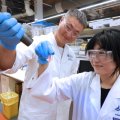A cancer genomics facility set to revolutionise cancer research will be unveiled at The University of Queensland Diamantina Institute (UQDI) on Tuesday, July 19.
The ACRF (Australian Cancer Research Foundation) Comprehensive Cancer Genomics Facility will be officially opened at 1pm at the UQDI, at The Princess Alexandra Hospital in Woolloongabba, Brisbane.
Funded by the ACRF, the AUD4 million centre provides researchers with Australia’s most advanced technology in the examination of cancer gene function.
The centre will enable researchers to study the causes of cancer, including identifying inherited risk factors and genetic mutations, and how these cause the disease.
“The ACRF Comprehensive Cancer Genomics Facility will provide researchers with unprecedented abilities to study the basic genetic causes of cancer, work out how those genetic factors cause disease, and importantly then to translate that back to the clinic by identifying potential cancer treatments,” the Director of the UQDI, Professor Matt Brown said.
“We are very excited about the potential this research facility gives our researchers to make discoveries which will make a real difference to cancer patient’s lives.”
The Arrayed Retroviral Expression Cloning (ARVEC) team at the UQDI will use this new technology to determine the function of 23,000 human genes and their role in common cancers and other diseases.
The Chief Executive of ACRF, Mr David Brettell, said the Foundation was "thrilled to have kick-started the development of such an amazing facility at the UQDI" with an AUD3.2 million research grant.
"The UQDI is a world renowned cancer research centre and this new facility is already proving to be a world-leader in cancer gene characterisation," Mr Brettell said.
“Every year, our independent medical research advisory committee, consisting of 13 esteemed Australian cancer researchers, recommends only the best cancer research initiatives to receive ACRF’s financial support.
“And the work being undertaken at the UQDI continues to impress them.”
The technology has the ability to screen tens of thousands of experiments involving millions of cells every week. Two decades ago, only half a dozen experiments were achievable within the same time frame.
“This is the UQDI’s second success story attributed to ACRF funding – the first being the development of the cervical cancer vaccines, which has had incredible implications for women around the world,” Mr Brettell said.
“This new centre’s close proximity to the Princess Alexandra Hospital provides unique access to clinical trials, and its potential to quickly translate lab results into tangible health outcomes for cancer patients is very exciting.
“This wonderful facility will help guide the future of cancer research in Australia and we’re thrilled to be the key partner.”
The facility was funded through a partnership between the ACRF, the Princess Alexandra Research Foundation, Queensland University of Technology’s Institute of Health and Biomedical Innovation and The University of Queensland Diamantina Institute.
The funding has expanded the solid foundation of cutting-edge technologies to create a unique, integrated cancer genetics and genomics facility on the PAH campus.
Please contact for interviews or photo opportunities:
Caroline Davy, UQDI: T 07 3176 6623 | M 0431 658 934 | E c.davy@uq.edu.au
Rebecca Hines, ACRF: T 02 9210 7411 | M 0431 068 089 | E rhines@acrf.com.au
Background info
Australian Cancer Research Foundation
The Australian Cancer Research Foundation is Australia’s leading private funder of cancer research programs across the country.
It awards up to 10 million dollars annually to provide Australia’s top cancer research centres with the very best in infrastructure, technologies and equipment. Grants are awarded based on the recommendations of an independent committee of thirteen highly esteemed Australian cancer researchers. Thanks to ACRF’s unique funding model, every dollar of every donation it receives funds cancer research projects that are truly world-class.
UQ Diamantina Institute
The University of Queensland Diamantina Institute was established in 2007 under the direction of Professor Ian Frazer, and was an amalgamation of the Centre for Immunology and Cancer Research (CICR) and the Centre for Diabetes and Endocrine Research (CDER).
The Institute, a modern research facility where clinical and basic science converge in the translational research of cancer and disorders of immune regulation, is headed by Professor Matthew Brown and hosts over 200 researchers, students and support staff. It lays claim to global, world-changing discoveries such as the world’s first cervical cancer vaccine.
Based at Brisbane’s leading teaching hospital, the Princess Alexandra Hospital, The University of Queensland Diamantina Institute has strong clinical interactions and world-class facilities that enable researchers to be at the forefront of their fields. Our researchers focus their efforts on turning their scientific discoveries into better treatments for diseases including a variety of cancers, osteoporosis, arthritis and other autoimmune diseases.
.jpg)









